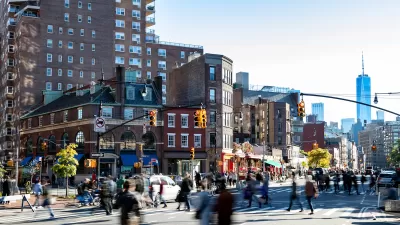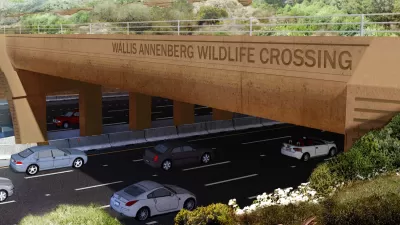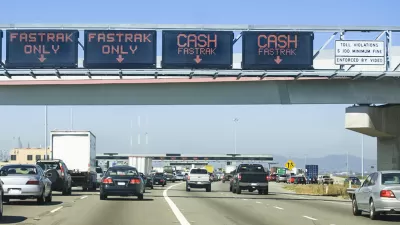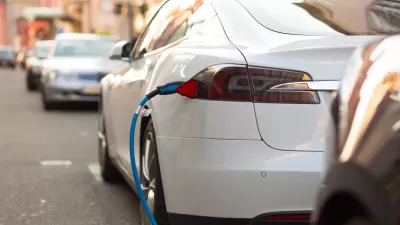The passage of the five-year FAST Act, the first long-term transportation bill since 2005, solidifies the trend that has been in place since 2008, when General Fund transfers to the Highway Trust Fund first began. Such transfers are now the new norm.
"From a policy standpoint, FAST (the Fixing America’s Surface Transportation Act) is little different from 2012’s MAP-21, the federal transportation legislation that came before it, preserving the general principle, for example, of funding highways and transit at roughly a four-to-one ratio," writes Yonah Freemark of The Transport Politic. "Nationally, transit will get about $50 billion over five years. This is the status quo that U.S. transport funding has stuck to since the early 1980s."
But what is definitively different about this legislation is that it reinforces the trend that has been developing over the past seven years: Transportation funding at the federal level no longer has to be derived from user fees.
FAST's predecessor, "MAP-21 was designed to only last two years for a reason: There was something of a consensus in Congress that some other reliable source of funding, preferably a user fee such as a gas tax increase or a vehicle-miles traveled fee, would come up," writes Freemark. FAST "is the first long-term bill that explicitly commits to this policy."
In 1956, the outside interests agreed with congressional leaders on a compromise for funding the Interstate System. The gas tax would be increased to 3 cents [from 2 cents], but highway user tax revenue from excise taxes on gasoline, tire rubber, tube rubber, and the sales tax on new trucks, buses, and trailers would be credited to a new Highway Trust Fund and reserved for use on the Interstate System and other highway projects. (The Highway Trust Fund is modeled after the Social Security Trust Fund-that is, the revenue goes into the general treasury, but is credited to the Fund.)
"FAST suggests that the amount of money collected via existing user fees is no longer relevant to the amount of money that should be spent," writes Freemark.
Despite the general hysteria in transportation circles in recent years over the fact that the U.S. gas tax has not been increased since 1993, Congress has not stopped filling the coffers; it has chosen instead to simply fill the gap through other means (the same cannot be said of every state, of course). This is not the outcome many would have predicted back in 2008.
The passage of FAST means that U.S. transportation policy is unlikely to change before its replacement is written in 2020 or 2021, and the revenue sources it commits to mean that there is no need for the Congress to expend the political capital to raise the gas tax until that time.
FAST relies on $70 billion in subsidies for the Highway Trust Fund from what are called "pay-fors", such as "taking $53.3 billion from the surplus of the Federal Reserve bank and $6.9 billion reducing the dividends that are paid to banks who are members of the Fed," writes Keith Laing of The HIll.
"Rather than leading, Congress is passing the buck by using a grab bag of budget gimmicks and poaching revenues from unrelated programs for years to come in order to pay for today’s transportation needs," said Sen. Tom Carper of Delaware, who joined Sen. Elizabeth Warren of Massachusetts as the only two Democratic 'nay' votes on the final deal, writes Jennifer Scholtes, transportation reporter for POLITICO Pro.
"While the proposal includes some good transportation policies, the way the bill is paid for is simply irresponsible," the Delaware Democrat said.
The Senate vote to approve the bill was 83-16; the House vote was 359-65. It was signed into law by President Obama on Friday afternoon, December 4.
*There is some dispute whether the gas tax is in fact a user fee.
Hat tip to Kenyon Karl, Sierra Club Transportation Forum

Pennsylvania Mall Conversion Bill Passes House
If passed, the bill would promote the adaptive reuse of defunct commercial buildings.

Planning for Accessibility: Proximity is More Important than Mobility
Accessibility-based planning minimizes the distance that people must travel to reach desired services and activities. Measured this way, increased density can provide more total benefits than increased speeds.

World's Largest Wildlife Overpass In the Works in Los Angeles County
Caltrans will soon close half of the 101 Freeway in order to continue construction of the Wallis Annenberg Wildlife Crossing near Agoura Hills in Los Angeles County.

Alaska Village Becomes Test Case for Climate Change Relocation
The Yup’ik village of Newtok is the first Alaska community to begin a full-scale relocation necessitated by the impacts of climate change. Another 31 Alaska communities remain vulnerable.

Amtrak Takes Lead on Texas Central Rail
The high-speed rail project isn’t a done deal, but if it moves forward, trains could begin operating in 2030.

Maine Approves Rent Relief Program
Legislators hope the assistance program will help struggling low-income households avoid eviction.
City of Costa Mesa
Licking County
Barrett Planning Group LLC
HUD's Office of Policy Development and Research
Mpact Transit + Community
HUD's Office of Policy Development and Research
Tufts University, Department of Urban and Environmental Policy & Planning
City of Universal City TX
ULI Northwest Arkansas
Urban Design for Planners 1: Software Tools
This six-course series explores essential urban design concepts using open source software and equips planners with the tools they need to participate fully in the urban design process.
Planning for Universal Design
Learn the tools for implementing Universal Design in planning regulations.


























